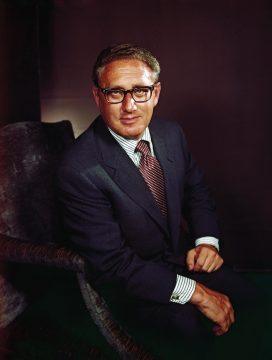 Thomas Meaney in The New Yorker:
Thomas Meaney in The New Yorker:
For more than sixty years, Henry Kissinger’s name has been synonymous with the foreign-policy doctrine called “realism.” In his time as national-security adviser and Secretary of State to President Richard Nixon, his willingness to speak frankly about the U.S.’s pursuit of power in a chaotic world brought him both acclaim and notoriety. Afterward, the case against him built, bolstered by a stream of declassified documents chronicling actions across the globe. Seymour Hersh, in “The Price of Power” (1983), portrayed Kissinger as an unhinged paranoiac; Christopher Hitchens, in “The Trial of Henry Kissinger” (2001), styled his attack as a charge sheet for prosecuting him as a war criminal.
But Kissinger, now approaching his ninety-seventh birthday, no longer inspires such widespread loathing. As former critics crept toward the political center and rose to power themselves, passions cooled. Hillary Clinton, who, as a law student at Yale, vocally opposed Kissinger’s bombing of Cambodia, has described the “astute observations” he shared with her when she was Secretary of State, writing in an effusive review of his most recent book that “Kissinger is a friend.” During one of the 2008 Presidential debates, John McCain and Barack Obama each cited Kissinger as supporting their (opposite) postures toward Iran. Samantha Power, the most celebrated critic of the U.S.’s failure to halt genocides, was not above receiving the Henry A. Kissinger Prize from him.
Kissinger has proved fertile ground for historians and publishers. There are psychoanalytic studies, tell-alls by former girlfriends, compendiums of his quotations, and business books about his dealmaking. Two of the most significant recent assessments appeared in 2015: the first volume of Niall Ferguson’s authorized biography, which appraised Kissinger sympathetically from the right, and Greg Grandin’s “Kissinger’s Shadow,” which approached him critically from the left. From opposing perspectives, they converged in questioning the profundity of Kissinger’s realism.
More here.
